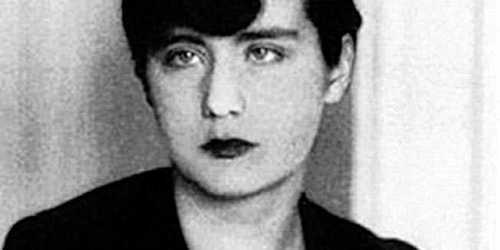Violet Gibson and Lucia Joyce. A little piece I’ve begun working on.
Violet Gibson was the daughter of an Irish aristocrat; she shot and wounded Mussolini, was briefly imprisoned and then sent to St Andrew’s Infirmary (a psychiatric hospital which today is Britain’s largest), near Northampton; Violet died there in 1956. Lucia Joyce was the daughter of the novelist, James Joyce. She, too, was committed to St Andrew’s (in 1951) and remained there until the end of her life, in 1982. We have very little information about her time there and letters, pictures and records held by the estate were destroyed.
The two women are buried near each other in Kingsthorpe cemetery, Northampton. We do not know anything which passed between the two women, although it is not unreasonable to think they may have met, so the story imagines how it might have been and was stimulated by the one picture of Violet Gibson in St Andrew’s which remains (there are none of Lucia): a delicate and elderly looking lady, in a winter coat, feeding the birds from her hand as she stood in the garden of the hospital. It made me cry. I am myself a long-time sufferer of mental health problems, so when I cried it was because I thought perhaps Violet and Lucia could have been better; been free. As birds.
What follows is a little extract from a short story I have drafted…who do you suppose the ‘He’ is?
And then the universe was not malicious; it was at worst benign, maybe laughing and with us, not at us, life, death and other tuppenny aches. The fuss, the both and trouble. So I was looking at my bed, tonight, St Andrew’s not the garden in Ireland (oh but of course you knew) and seeing a counterpane above the boiled grey blankets, felted with the hard wash and the stretched linen corpse sheets. I hate them beyond expression and into silence. But I am being bad. I promised to be a good girl. You know, they could have hanged me, out there, in there; instead this incarceration and boiled wool beds and corpse linen. But Il Duce, grazed by my bullets, he thought he would live forever. I thought of Ozymandias, trunkless legs lost to sand and a wind-blown inscription.
They hung the man up by his heels, the man I shot, why I was here.
He never expected that.
Look, I survived him.
Tomorrow.
I promise.
**********
Night passes. Nightingales; shrieks and screams and an administering.
The night doctor is called, grey from sleep.
Rattle-bags and tired bones. Unintended forevers.
Today.
**********
‘I have decided I must talk more to Lucia and I will do something for her. I heard whispers from the walls. I am not supposed to know. It’s said that she has been rubbed out. Her letters gone; records destroyed, gone to dust. No-one speaks of her. If Nora came, I didn’t see her. If He came, I couldn’t say, although perhaps only once and that perfunctorily. That was what I heard. No—not from the birds, if that was what you thought: from the nurses’ bird chatter. And if He came, He never came back.
Everyone has forgotten her. She had no gun. It is not right. I want to give something to her.
I creep.
She says this.
‘Father said my body would not could not dance. He was a genius, I know, they say, they know. He said I was good, I wanted ballet, but my body was stiff and cold; I couldn’t do. So he said; so he told them. I left. Draw, write. The Wake. The talk between us. It wasn’t so much; just knowing: nods and sighs; a sort of creole. But not so much. I murmured and said I wanted something that was mine but he wanted to look after me. Mother did not come again, not after the first time. There were men, before, there was Him. Also genius. He saw the world for what it was: bad tallow and ashes but oh my father said differently: that the reach of man, if he knew, if he let, if he thought, could extend out there into the universe.
But did you know Him, in Ireland, or was He gone to Paris then?’
Her gutturals like furrows.
She is not like us; not one of us. But she is interesting, is she not?
And it is not fair, what they have done. They made her not exist, out there.
‘He refused me. I suppose others know. Not about me, about Him, He would be, must be famous now. Violet. I promise I will not shout and I do not have fire. I am so alone, lonely. You should not be here. This is our punishment, making us well, not or maybe. I cannot think. I cannot make it go in straight lines or proper lengths.’
Gutturals like furrows.
Thoughts run rivulets and turn, as they should not.
Lucia cries, as she always does. I cannot because there is no cry left.
And I think that cry is cry and all that can matter is that it should stop.
He cried in pain, he cried to laugh, to mock and they strung him up by his heels.
Now that was fair.
‘Come with me, Lucia.’
‘It is forbidden.’
‘What is the worst they can do? We are already bound over, in this forever place.’
‘But don’t you think He will come for me?’

(The photo here is of Lucia Joyce; the featured image that of Violet Gibson, in the grounds of St Andrew’s.)





